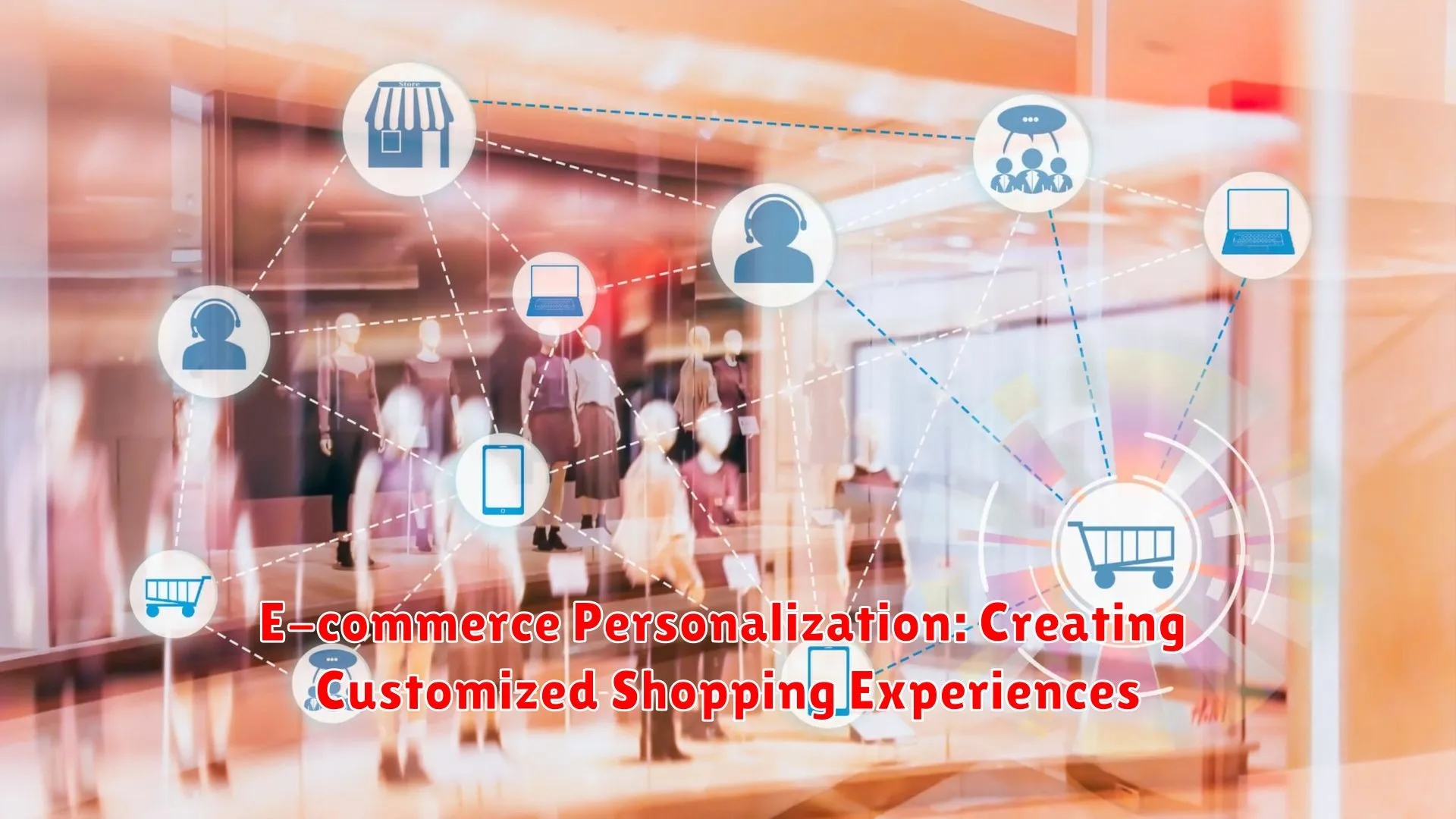Learn how e-commerce personalization is revolutionizing online shopping. Discover the power of creating tailored shopping experiences for customers.
The Importance of Personalization in E-commerce

In the realm of E-commerce, personalization plays a crucial role in enhancing the overall shopping experience for customers. By tailoring product recommendations, marketing messages, and website interfaces to individual preferences, E-commerce platforms can create a customized shopping journey that resonates with each visitor.
Personalization allows E-commerce businesses to forge stronger connections with their customers by showing that they understand and value their unique needs and preferences. This not only leads to increased customer satisfaction but also fosters loyalty and repeat purchases.
Moreover, personalization in E-commerce enables businesses to boost conversion rates by presenting customers with relevant products that align with their interests and purchase history. By leveraging data analytics and AI technologies, E-commerce platforms can deliver targeted recommendations that are more likely to result in successful transactions.
For E-commerce companies, implementing effective personalization strategies is essential in today’s competitive market landscape. By creating customized shopping experiences, businesses can differentiate themselves, build brand loyalty, and ultimately drive long-term profitability.
Techniques for Personalizing the Shopping Experience

Personalizing the shopping experience in e-commerce is essential in creating customized and appealing interactions for customers. By implementing various techniques, e-commerce platforms can enhance user engagement and increase customer satisfaction.
Here are some effective techniques for personalizing the shopping experience:
- Recommendation Algorithms: Utilize intelligent algorithms to analyze customer data and behavior to provide personalized product recommendations. This helps customers discover new products tailored to their preferences.
- User Profiling: Develop detailed user profiles by collecting data on shopping habits, past purchases, and preferences. This information can be used to personalize product suggestions and promotions.
- Dynamic Content: Display dynamic content based on customer interactions, such as showcasing recently viewed items or highlighting products related to a customer’s interests.
- Personalized Emails: Send targeted email campaigns that cater to individual customer preferences, including personalized product recommendations, special offers, and promotions.
- Customized User Interface: Tailor the user interface to each customer by displaying relevant products, personalized recommendations, and content that aligns with their interests.
By leveraging these techniques, e-commerce businesses can create a more personalized shopping experience that resonates with customers, fosters brand loyalty, and ultimately drives sales.
Utilizing Data for Effective Personalization

Personalizing the e-commerce shopping experience has become a key strategy for businesses seeking to engage customers and drive sales. One powerful way to achieve this is through the effective utilization of data.
1. Analyzing Customer Preferences: By collecting and analyzing data on customers’ browsing behavior, purchase history, and demographic information, e-commerce platforms can gain valuable insights into individual preferences and shopping patterns.
2. Segmenting Customers: Utilizing data to segment customers into groups based on their behavior and preferences allows for targeted marketing campaigns and personalized product recommendations.
3. Dynamic Website Customization: Data-driven personalization enables e-commerce websites to dynamically customize the user experience, including product suggestions, pricing options, and promotional offers based on individual interests.
4. Real-time Personalization: Leveraging real-time data tracking and analysis allows e-commerce platforms to tailor the shopping experience as customers interact with the site, increasing the likelihood of conversion and customer satisfaction.
By harnessing the wealth of data available, e-commerce businesses can create personalized shopping experiences that are not only relevant and engaging but also drive customer loyalty and increase revenue.
Personalization Across Different Channels

In the realm of e-commerce, personalization plays a crucial role in creating customized shopping experiences for consumers. When it comes to personalization across different channels, it involves tailoring interactions and recommendations based on individual preferences and behaviors, regardless of the platforms used.
One effective way to implement personalization across various channels is through data collection and analysis. By gathering data such as browsing history, purchase patterns, and demographic information, online retailers can gain valuable insights into each customer’s preferences and interests.
Another key aspect of personalization is omnichannel integration, which ensures a seamless experience for customers across multiple touchpoints. Whether a customer is browsing on a website, engaging on social media, or visiting a physical store, consistent and personalized interactions enhance overall shopping satisfaction.
Utilizing personalized recommendations is also essential in delivering a tailored shopping experience. By leveraging algorithms that analyze customer data, e-commerce platforms can suggest relevant products, promotions, and content that are more likely to resonate with each individual.
Moreover, dynamic content personalization allows for real-time adjustments to be made based on user behavior. This means that content, such as product displays or marketing messages, can be dynamically customized to better engage and convert customers.
By embracing personalization across different channels, e-commerce businesses can effectively engage customers, drive conversions, and foster long-lasting relationships built on personalized experiences.
Measuring the Impact of Personalization

Personalization in e-commerce entails tailoring shopping experiences to individual users based on their preferences, behavior, and demographic information. By implementing customized features, e-commerce platforms can provide a more engaging and relevant experience for their customers. However, the effectiveness of personalization strategies needs to be measured to gauge their impact on sales and customer satisfaction.
Data Collection: One way to measure the impact of personalization is to collect and analyze user data. This includes tracking user interactions, browsing history, purchase patterns, and feedback. By leveraging data analytics tools, businesses can gain insights into customer behavior and preferences, enabling them to refine their personalization strategies.
A/B Testing: Another method to measure the impact of personalization is through A/B testing. This involves comparing two versions of a website or app with and without personalized features to determine which performs better in terms of conversion rates, click-through rates, and other key metrics. A/B testing helps businesses assess the effectiveness of their personalization efforts.
Conversion Rates: Monitoring conversion rates before and after implementing personalization can provide valuable insights into the impact of personalized recommendations, product suggestions, and targeted promotions. An increase in conversion rates indicates that personalization is resonating with customers and driving them to make purchases.
Customer Feedback: Gathering feedback from customers about their shopping experience post-personalization can offer qualitative insights into the effectiveness of personalization strategies. Positive feedback, such as improved satisfaction or enhanced user experience, indicates that personalization is adding value to the shopping journey.
In conclusion, measuring the impact of personalization in e-commerce is crucial for businesses to optimize their strategies and enhance customer engagement. By utilizing data analysis, A/B testing, monitoring conversion rates, and collecting customer feedback, companies can evaluate the effectiveness of their personalization efforts and make informed decisions to create a more personalized shopping experience.
Challenges and Considerations in Personalization

Personalizing the shopping experience in e-commerce comes with various challenges and considerations that businesses need to address to create truly customized interactions for their customers.
Data Privacy and Security: One of the primary concerns in e-commerce personalization is maintaining the privacy and security of customer data. Businesses must establish robust security measures to safeguard sensitive information while ensuring compliance with data protection regulations.
Data Accuracy and Quality: Ensuring the accuracy and quality of data forms the foundation of effective personalization. Businesses face the challenge of collecting and managing vast amounts of data efficiently to deliver relevant and personalized experiences to their customers.
Integration of Technology: Implementing the right technology solutions and tools is crucial for successful personalization. Businesses must invest in advanced AI and machine learning capabilities to analyze customer behavior and preferences accurately.
Personalization at Scale: Scaling personalization efforts to cater to a large customer base can be daunting. Businesses need to strike a balance between automation and human touch to provide personalized experiences that resonate with individual customers.
Customer Trust and Transparency: Building trust with customers through transparent personalization practices is essential. Businesses must communicate clearly about how they use customer data to personalize experiences and provide opt-in options for data sharing.
Case Studies: E-commerce Brands Leading in Personalization

When it comes to E-commerce personalization, several brands have excelled in creating customized shopping experiences tailored to their customers’ preferences. Let’s take a closer look at some successful case studies:
- Amazon:
As a pioneer in personalization, Amazon utilizes sophisticated algorithms to analyze customer behavior and provide targeted product recommendations. By leveraging data on past purchases and browsing history, they offer a highly personalized shopping experience for each user.
- Netflix:
Netflix is known for its advanced personalization engine that suggests movies and TV shows based on a user’s viewing history and preferences. By providing tailored recommendations, Netflix keeps its subscribers engaged and satisfied.
- Sephora:
Sephora’s personalization strategy includes offering beauty product recommendations based on skin type, color preferences, and purchase history. Their Beauty Insider program further enhances the shopping experience by providing exclusive offers and personalized content.
These e-commerce brands have set a benchmark in personalization by understanding their customers’ needs and preferences, ultimately leading to increased customer satisfaction and loyalty.
Conclusion: The Future of Personalized E-commerce

Personalized e-commerce is rapidly evolving and shaping the way consumers interact with online platforms. The future of personalized e-commerce is poised to bring even more tailored shopping experiences to consumers, ultimately revolutionizing the way people shop online.
In the coming years, advancements in data analytics and artificial intelligence will play a significant role in enhancing personalized e-commerce. Retailers will leverage these technologies to gain deeper insights into consumer behavior, preferences, and purchasing patterns, allowing them to offer individualized product recommendations and customized shopping journeys for each customer.
Moreover, the integration of virtual reality and augmented reality technologies will take personalized e-commerce to the next level by enabling customers to virtually try on products, visualize items in their homes, and enhance the overall shopping experience. This immersive approach will provide a more interactive and engaging online shopping experience for consumers.
As personalization continues to drive e-commerce forward, businesses will need to prioritize privacy and data security to build and maintain trust with their customers. Transparency and data protection measures will be crucial to address consumer concerns and ensure the safe handling of personal information.
Overall, the future of personalized e-commerce looks promising, with a focus on delivering seamless, tailored, and immersive shopping experiences that cater to the unique needs and preferences of each individual customer. By embracing technological advancements and prioritizing customer trust, personalized e-commerce is set to reshape the way we shop online.
Conclusion
Embracing e-commerce personalization enhances customer satisfaction by providing tailored shopping experiences, leading to increased engagement and sales.

